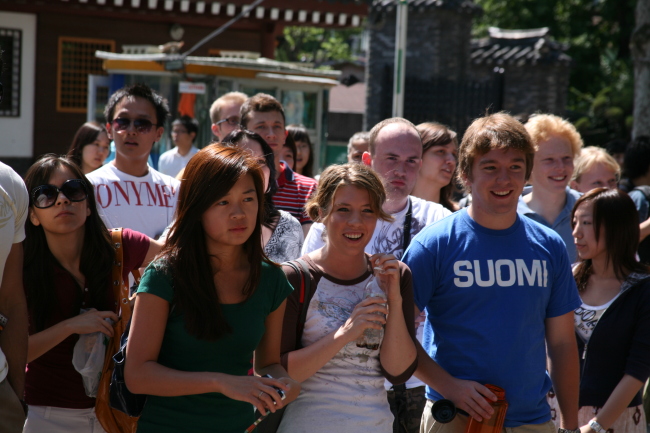SKKU on path to become top global university
2013-10-09 20:01
 |
| Participants in SKKU’s International Summer Semester walk on the campus in Seoul. More than 1,720 students took part in the four-week program for international students held from June 27 to July 24. (SKKU) |
In less than two years, the 62-year-old president has already made strides toward that goal. The school was picked as the country’s best four-year general university, excluding two science institutes, recently by the JoonAng Ilbo. Its global MBA program and medical school are among the most successful in the nation.
And despite the shrinking job market, SKKU’s graduate employment rate has continued to rise. This year its graduate employment rate stood at 69.3 percent, the highest among four-year universities across the country.
Founded in 1398, Sungkyunkwan was the place of study and repose for the king’s scholars during the Joseon Dynasty. Confucianism is still the guiding principle of the longest-running higher education institute in Korea, which is nestled beside a palace in central Seoul.
Yet, today, its prestige lies not in traditional subjects but in global business, cutting-edge technology and international exchange programs.
SKKU currently runs a highly reputed semiconductor engineering department that has supplied talents to the nation’s key growth industry, and also is a leader in research into graphene ― the thinnest, lightest and strongest material known to man.
Notably, researchers from the school hold more than 134 graphene patents as of January 2013, the largest number of any research institute in the world, according to U.K.-based patent consultancy Cambridge IP.
The increase in the foreign student body also serves as a sign of the accelerated global presence of the school. There are now more than 2,700 international students enrolled at SKKU and each year more than 2,000 students go abroad to study at partner universities, according to Kim.
“Globalization has been our main priority over the past years,” the president told The Korea Herald.
Since he took the helm of the school, Kim has been working hard to extend networks with foreign universities around the world.

Kim also launched a special student exchange program called Supreme Studies, which provide selected students with 10 million won ($9,330) each in scholarship grants to study for a semester in 14 prestigious universities in the U.S. and Europe.
“We require students to go abroad and study at least one semester with our partner universities during their degree. We believe the experience is vital to enhancing our students’ understanding of global society,” Kim said.
Global partnership is a part of his long-term plan to make SKKU a global leading university by 2020, which aims to make SKKU one of the top 50 institutions in the world with its academic programs in at least 10 fields, such as global business administration and semiconductor system engineering, ranking within the top 10 by that year.
The president has already seen rapid progress toward that goal. This year, in particular, the SKK Graduate School of Business was ranked in 51st place, up 15 places from a year ago, in the Financial Times Global MBA Ranking, the highest mark a Korean school has ever registered since full-time MBA programs were launched in the country.
This year, SKKU entered the world top 100 in 16 academic fields out of 20 by the QS World University Ranking by Subject. In particular, chemical engineering ranked 41st and many other subjects entered the top 100 on the list, including mechanical engineering, pharmacy, advanced materials sciences and engineering, and journalism and mass communication.
“To build global competiveness, we not only have to send our students abroad but also invite more foreign students and faculty members from abroad,” he added.
SKKU began the International Summer Semester, a four-week summer school for international students, in 2008. Now in its sixth year, 1,727 students from 84 different colleges and universities took part in the program this summer.
The key to the success of its summer program, Kim said, is the outstanding professors and high-quality education content ― the faculty of the SKKU summer semester includes world-renowned professors such as Charles Hampden-Turner from the University of Cambridge.
The academic and industrial cooperation to train students to meet the needs of business began to speed up as Samsung Group, the leading conglomerate in Korea, acquired the foundation of SKKU in 1996. Samsung now supports SKKU with more than 100 billion won of funding each year, and the two currently carrying out more than 200 joint research projects.
Kim noted that the goal of making SKKU one of the top 50 universities in the world is well underway.
“SKKU has expanded and developed rapidly over the past decade, and now we are focusing on developing software power to build our global competiveness,” he added.
By Oh Kyu-wook (596story@heraldcorp.com)


